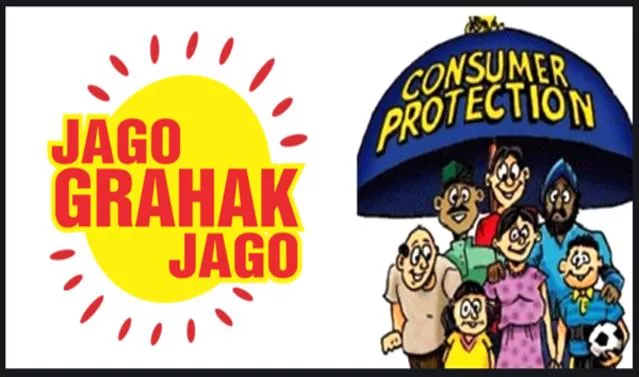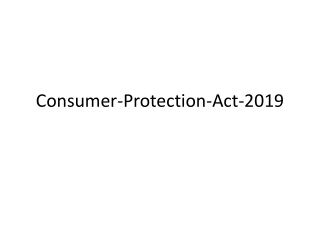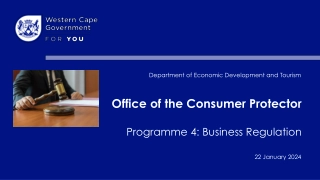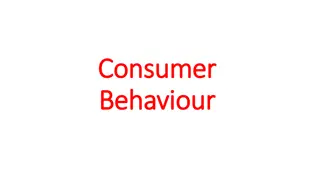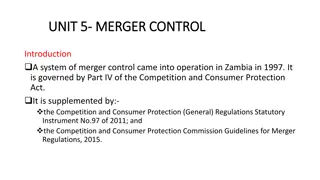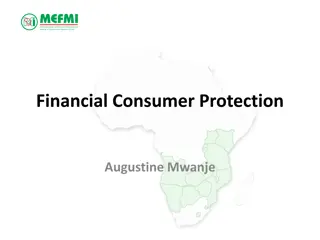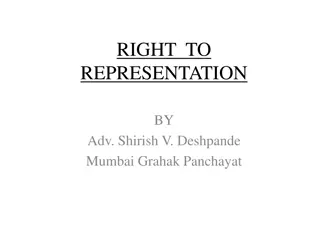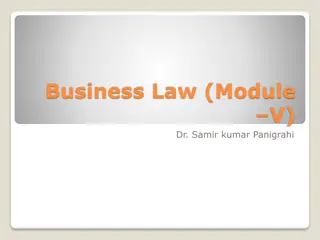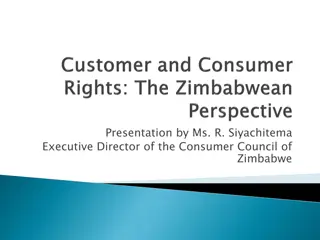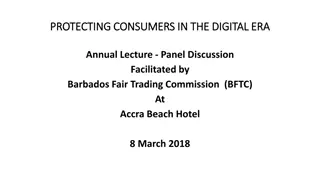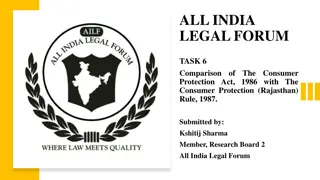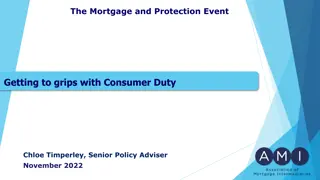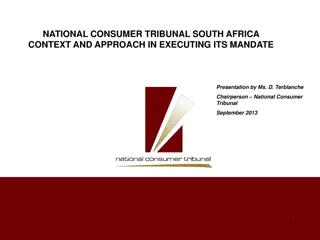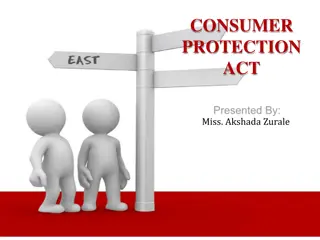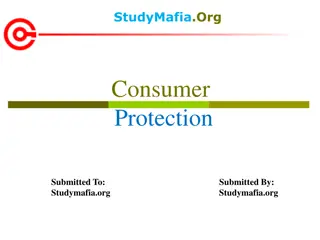Overview of the Consumer Protection Act, 2019
The Consumer Protection Act, 2019 aims to provide efficient resolution of consumer disputes and enforce consumer rights. It replaced the 1986 Act and includes new provisions such as online consumer protection, product liability, and expanded definitions of goods and services. The Act covers aspects like who qualifies as a consumer, exclusions from consumer definition, and the responsibilities of manufacturers and service providers.
Download Presentation

Please find below an Image/Link to download the presentation.
The content on the website is provided AS IS for your information and personal use only. It may not be sold, licensed, or shared on other websites without obtaining consent from the author.If you encounter any issues during the download, it is possible that the publisher has removed the file from their server.
You are allowed to download the files provided on this website for personal or commercial use, subject to the condition that they are used lawfully. All files are the property of their respective owners.
The content on the website is provided AS IS for your information and personal use only. It may not be sold, licensed, or shared on other websites without obtaining consent from the author.
E N D
Presentation Transcript
Consumer Protection Consumer Protection Act Act - - 2019 2019 http://bankingdigests.com/
INTRODUCTION The Consumer Protection Act, 2019 has been enacted for the purpose of providing timely and effective administration and settlement of consumer disputes and related matters. It is a legal force available to customer to enforce their right as consumer. The Consumer Protection Act was initially enacted in 1986 and implemented from April 15, 1987. Amendment on 17.12.2002, and implemented w.e.f. 15th March 2003 (World Consumers Rights Day). Further, it was amended in 2019 as The Consumer Protection (Amendment) Bill, 2019 . 2019 Act was passed by the Indian Parliament and received the assent of the President on the 9th August, 2019. This new act replaced the old Consumer Protection Act, 1986.
DEFINITION OF CONSUMER Consumer means any individual who- 1) Buys any goods for a consideration which has been paid or promised or partly paid and partly promised; or 2) Hires or avail of any services for a consideration which has been paid or promised or partly paid and partly promised, or under any system of deferred payment; 3) Includes any user of such goods other than the person who buys such goods or hires of any services for consideration paid; or 4) Promised or partly paid or partly promised, or under any system of deferred payment, when such use is made with the approval of such person.
WHI IS NOT A CONSUMER ? 1.Person buying goods for resale. 2.Person buying goods for any commercial purpose. 3.Person receiving goods/services free or gifts. 4.Person enjoying personal service under a contract( i.e.- service by employees/maid servants) etc.
CONSUMER DEFINITION CHANGES UNDER ACT, 2019 Those who make purchases online. Endorsement of goods and services, normally done by celebrities, are also covered within the ambit of the 2019 Act. In fact, an additional onus has been placed on endorsers, apart from manufacturers and service providers, to prevent false or misleading advertisements. The definition of goods has been amended to include food as defined in the Food Safety and Standards Act, 2006 and included food delivery platforms within the fold of the 2019 Act. Interestingly, telecom has been added to the definition of services to bring telecom service providers within the purview of the 2019 Act.
CONSUMER DEFINITION CHANGES UNDER ACT, 2019 A significant addition to the 2019 Act is the introduction of product liability whereby manufacturers and sellers of products or services have been made responsible to compensate for any harm caused to a consumer by defective products or for deficiency in services. Another newly introduced concept is that of unfaircontracts aimed to protect consumers from unilaterally skewed and unreasonable contracts which lean in favour of manufacturers or service providers. The definition of unfair trade practices has been enlarged to include electronic advertising which is misleading, as well as refusing to take back or withdraw defective goods, and to refund the consideration within the period stipulated within a period of 30 days.
COVERAGE UNDER THE ACT Explanation: - For the purposes regarding definition of consumer; (a) The expression "commercial purpose" does not include use by a person of goods bought and used by him exclusively for the purpose of earning his livelihood, by means of self-employment; (b) The expressions "buys any goods" and "hires or avails any services" includes offline or online transactions through electronic means or by tele-shopping or direct selling or multi-level marketing; Coverage: All goods and services including banking, insurance, transport, processing, electricity, professional such as physicians etc. in private, public and cooperative sectors are covered under this Act. All banking services are covered due to their being essential services.
RIGHTS OF CONSUMERS The act provides following rights to the consumers; i. To have information about the quantity, quality, purity, potency, price, and standard of goods or services; ii. To be protected from hazardous goods and services; iii. To be protected from unfair or restrictive trade practices; iv. To have a variety of goods or services at competitive prices; v. To have the right to consumer awareness.
CONSUMER PROTECTION COUNCIL To promote and protect the right of the consumers, established. Their scope is not regarding directly dealing with the consumer complaints at initial or appellate scope but to promote and protect the rights of consumer. councils are
OBJECTIVE OF THE COUNCILS The objectives of the Councils under Consumer Protection Act is to promote and protect the rights of the consumers such as:- The right to be protected against the marketing of goods and services which are hazardous to life and property. The right to be informed about the quality, quantity, potency, purity, standard and price of goods or services, as the case may be so as to protect the consumer against unfair trade practices; The right to be assured, wherever possible, access to a variety of goods and services at competitive prices; The right to seek redressal against unfair trade practices or restrictive trade practices or unscrupulous exploitation of consumers; and The right to consumer education.
CENTRAL CONSUMER PROTECTION COUNCIL The Central Government has established a council known as the Central Consumer Protection Council, called the Central Council. The Central Council consist of the following: a) The Minister-In-charge of the Consumer Affairs in the Central Government shall be the Chairman of the council, and b) Such member of other official or non-official members representing such interests as may be prescribed. The Central Council shall meet as and when necessary but at least once in a year.
STATE CONSUMER PROTECTION COUNCIL The State Government has established a council known as the State Consumer Protection Council, called the State Council. The State Council consist of the following: a) The Minister-In-charge of the Consumer Affairs in the State Government shall be the Chairman of the council, b) Such member of other official or non-official members representing such interests as may be prescribed by the State Government, and c) Such member of other official or non-official members not exceeding ten as may be nominated by Central Government. The State Council shall meet as and when necessary but at least twice in a year.
DISTRICT CONSUMER PROTECTION COUNCIL The State Government has established a council known as the District Consumer Protection Council in every district, called the District Council. The District Council consist of the following: a) The Collector of the District shall be the Chairman of the council, b) Such member of other official or non-official members representing such interests as may be prescribed by the State Government, and The State Council shall meet as and when necessary but at least twice in a year.
CENTRAL CONSUMER PROTECTION AUTHORITY (CCPA) One of the most significant additions to the 2019 Act is to establish Central Consumer Protection Authority (CCPA) with the following features; The Central Authority shall consist of a Chief Commissioner and other Commissioners as may be prescribed, to be appointed by the Central Government. The Central Authority shall have an Investigation Wing headed by a Director General for the purpose of conducting inquiry or investigation under this Act. The CCPA has to regulate, protect and enforce the interest of the consumers and matters related to unfair trade practices.
CENTRAL CONSUMER PROTECTION AUTHORITY (CCPA) The CCPA has been provided with vast powers to inquire, investigate and take action against violations of the 2019 Act. Another significant power the CCPA has been showered with, is the power to take action and impose penalty against misleading and false advertisement as well as against any endorser of such advertisement. It means the CCPA can now initiate action against the celebrities who have endorsed such misleading and false advertisement provided such celebrities failed to carry out any due diligence before participating in such advertisements. The CCPA may impose a penalty of up to Rs.10 Lakhs for first violation and up to Rs.50 Lakhs on every subsequent violation on a manufacturer or an endorser, for a false or misleading advertisement. In addition to this, such manufacturer or endorser may be sentenced to imprisonment for upto two years.
WHO CAN FILE A COMPLAINT ? A consumer (individually or jointly), any voluntary consumer organisation, Central or State Governments. Limitation period is 2 years from the date of cause of action i.e. purchase of goods/hiring of services.
PROCEDURE A simple written complaint in duplicate with full name and address of opposite party narrating facts of the complaint along with copies of the supporting documents and details of relief sought. No Court Fee is charged. Engaging of Lawyer is not necessary, consumer or anyone can represent his case.
CONSUMER CAN FILL HIS COMPLAIN IN THE FOLLOWING CONSUMER COMMISSION 1) District Commission: A District Commission established by the State Government in each district of the State by notification. The District Commission have jurisdiction to entertain complaints where the value of the goods or services paid as consideration does not exceed Rs. 1 Crore. 2) State Commission: Each State Commission shall consist of a President and not less than four members. complaints where the value of the goods or services paid as consideration, exceeds rupees one crore, but does not exceed rupees ten crore. 3) National Commission: The National Commission shall consist of a President and not less than four members. complaints where the value of the goods or services paid as consideration, exceeds rupees one crore, but does not exceed rupees ten crore.
PECUNIARY JURISDICTION Commission Claim Amount Office Structure . District Commission Up to Rs. 1 Crore Headed by President & 2 other members. State More than Rs. 1 Crore up to Rs. 10 Crore Headed by President & 4 other members. Commission National Commission Above Rs. 10 Crore Headed by President & 4 other members. Maximum age 70 years for President and 67 years for any other member.
CONSUMER MEDIATION CELL Another provision introduced by the 2019 Act to ensure speedy resolution of disputes is to provide for referring the disputes to mediation. The Consumer Commission shall refer the matter to mediation on written consent of both the parties. The State Government shall establish a consumer mediation cell to be attached to each of the District/State Commissions of that State. The Central Government shall establish a consumer mediation cell to be attached to the National Commission. Every consumer mediation cell shall maintain: (a) a list of empanelled mediators; (b) a list of cases handled by the cell; (c) record of proceeding; and (d) any other information as may be specified by regulations. The Commission shall within seven days of the receipt of the settlement report pass suitable order recording such settlement of consumer dispute and dispose of the matter accordingly.
RELIEF BY DISTRICT COMMISSION If, after the proceeding conducted the District Commission is satisfied about the complaint, it shall issue an order to the opposite party directing him: To remove the defect pointed out from the goods; To removal of deficiencies in services; To replacement by new goods free from defects; To refund of price/ charges etc.; To pay such amount as may be awarded as compensation to the consumer for any loss or injury suffered by the consumer, due to the negligence of the opposite party.
SUMMARY OF OFFENCE AND PUNISHMENT Particulars Offence Type Punishment Amount Min. Rs. 25000/- Max. Rs. 1 Lakh Max. Rs. 20 Lakh Imprisonment Period Min. 1 month Max. 3 years Max. 6 months Order made by the District / State / National Commission Direction of Central Authority Fails to comply with any Found guilty direction First time offence every subsequent offence Does not result any injury Causing injury not amounting to grievous hurt False or misleading advertisement Manufacturing for sale or storing, selling or distributing or importing products containing adulterant or importing spurious goods. (1st conviction, suspend licence for a period up to two years, and in case of second or subsequent conviction, cancel the licence) Max. Rs. 10 Lakh Max. Rs. 50 Lakh Max. Rs. 1 Lakh Max. Rs. 3 Lakh Max. 2 years Max. 5 years Max. 6 months Max. 1 years Causing injury resulting in grievous hurt Max. Rs. 5 Lakh Max. 7 years non-bailable Min. 7 years Max. Whole life non-bailable Results in the death of a consumer Min. Rs. 10 Lakh
APPEAL AGAIST THE ORDER Any person may appeal to State Commission against the award of District Commission within 45 days from the date of order after Deposit amount is 50% of the amount. Any person may appeal to National Commission against the award of State Commission within 30 days from the date of order after Deposit amount is 50% of the amount. Any person may appeal to Supreme Court against National Commission within 30 days from the date of order after Deposit amount is 50% of the amount. A person aggrieved by any order passed by the Central Authority may file an appeal to the National Commission within a period of thirty days from the date of receipt of such order.
TIME LIMIT FOR ACTION ACTION TAKEN ON COMPLAINT TIME LIMIT Admission of complaint from the date of receipt of the complaint. Disposal without analysis or testing of commodities. 21 days 3 months Disposal analysis or testing of commodities. Appeal against the order made by the District Commission to the State Commission. Appeal against the order made by the State Commission to the National Commission. Appeal against the order made by the National Commission to the Supreme Court. Appeal against the order made by the Central Authority to the National Commission. Decision should be taken on Appeals for admission or rejection. 5 months 45 days 30 days 30 days 30 days 90 days
For more details, you may visit the website https://www.consumer-voice.org/consumer-protection-act-1986/










